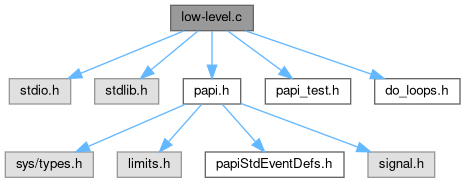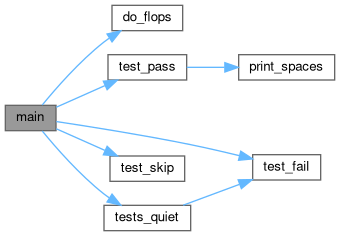Loading...
Searching...
No Matches
Include dependency graph for low-level.c:

Go to the source code of this file.
Macros | |
| #define | NUM_EVENTS 2 |
Functions | |
| int | main (int argc, char **argv) |
Macro Definition Documentation
◆ NUM_EVENTS
| #define NUM_EVENTS 2 |
Definition at line 30 of file low-level.c.
Function Documentation
◆ main()
Definition at line 33 of file low-level.c.
34{
40
41 /* Set TESTS_QUIET variable */
43
47 }
48
49 /* query and set up the right events to monitor */
51 Events[0] = PAPI_FP_INS;
52 Events[1] = PAPI_TOT_CYC;
53 } else {
54 Events[0] = PAPI_TOT_INS;
55 Events[1] = PAPI_TOT_CYC;
56 }
57
61 }
62
67 }
68
70 printf( "\n Incorrect usage of read and accum.\n" );
71 printf( " Some cycles are counted twice\n" );
72 }
75
76 /* Loop 1 */
78
81
84
85 /* Loop 2 */
87
88 /* Using PAPI_accum here is incorrect. The result is that Loop 1 *
89 * is being counted twice */
92
95
96 /* Loop 3 */
98
101
104
107 "(Reading stopped counters)\n" );
108
110
111 printf( "\n Incorrect usage of read and accum.\n" );
112 printf( " Another incorrect use\n" );
113 }
116
117 /* Loop 1 */
119
122
125
126 /* Loop 2 */
127 /* Code that should not be counted */
129
132
135 "(Intermediate counts...)\n" );
136
137 /* Loop 3 */
139
140 /* Since PAPI_read does not reset the counters it's use above after *
141 * loop 2 is incorrect. Instead Loop1 will in effect be counted twice. *
142 * and the counts in loop 2 are included in the total counts */
147
150
152 printf( "\n Correct usage of read and accum.\n" );
153 printf( " PAPI_reset and PAPI_accum used to skip counting\n" );
154 printf( " a section of the code.\n" );
155 }
158
160
165
166 /* Code that should not be counted */
168
171
173 printf( "%12s %12s (Counters reset)\n", "", "" );
174
176
179
182
184 printf( "----------------------------------\n" );
185 printf( "Verification: The last line in each experiment should be\n" );
186 printf( "approximately twice the value of the first line.\n" );
187 printf
188 ( "The third case illustrates one possible way to accomplish this.\n" );
189 }
190 test_pass( __FILE__ );
191
192 return 0;
193}
Accumulate and reset counters in an EventSet.
add multiple PAPI presets or native hardware events to an event set
Create a new empty PAPI EventSet.
initialize the PAPI library.
Query if PAPI event exists.
Read hardware counters from an event set.
Reset the hardware event counts in an event set.
Start counting hardware events in an event set.
Stop counting hardware events in an event set.
void PAPI_NORETURN test_fail(const char *file, int line, const char *call, int retval)
Definition: test_utils.c:491
void PAPI_NORETURN test_skip(const char *file, int line, const char *call, int retval)
Definition: test_utils.c:584
Here is the call graph for this function:
